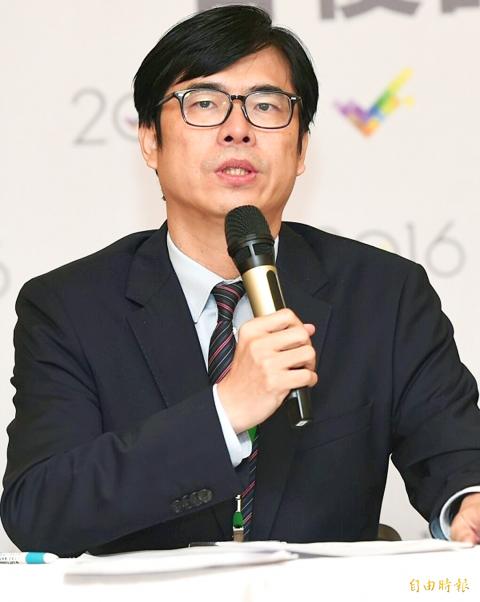Taiwan is to test its cyberdefense capabilities in the first-ever Cyber Offensive and Defensive Exercises to be held with the US in November, Vice Premier Chen Chi-mai (陳其邁) said yesterday.
Chen, who is also head of the Cabinet department for information security, said that in the wake of increasing cyberattacks targeting the government, the department has been holding regular cybersecurity drills to test the readiness and responsive capabilities of related authorities.
As part of ongoing efforts to respond to such threats, Chen said Taiwan and the US are to hold the five-day Cyber Offensive and Defensive Exercises in early November.

Photo: Ko Yu-hao, Taipei Times
The drill was first announced by American Institute in Taiwan (AIT) Director Brent Christensen during a cybersecurity forum in Taipei on Tuesday.
According to Chen, the exercises will be similar to the Cyber Storm exercises, which are the US Department of Homeland Security’s exercises to strengthen cyberpreparedness in the public and private sectors, held every two years.
First launched in 2006, the exercises were last held in the spring of last year.
Chen said the upcoming exercises in Taiwan would be divided into two parts, with the first testing the response of government staff and officials to phishing e-mails or text messages, which are the most common form of cyberattack.
The second part of the drill would examine responses in the public and private sectors to cyberattacks launched from foreign countries or locally, he said.
The Cyber Offensive and Defensive Exercises are scheduled to bring together teams from 15 nations to address simulated cyberthreats from North Korea, targeting social engineering, critical infrastructure and financial institutions, Chen said.
He would not name the 15 countries, saying only that the teams would be Asian, European and American.
The teams are to be designated blue (defense) and red (attack), with Taiwan’s security team as the blue team and the 15 other countries as the red team.
The simulated attacks will attempt to hack official Taiwanese government Web sites to test the capability of local cybersecurity teams to protect them and respond to the potential effects of such attacks, Chen said.
Taiwan is hoping that the debut cybersecurity drill will not only prepare the government for attacks, but also help Taiwan and other nations form a joint cybersecurity network, he added.

The CIA has a message for Chinese government officials worried about their place in Chinese President Xi Jinping’s (習近平) government: Come work with us. The agency released two Mandarin-language videos on social media on Thursday inviting disgruntled officials to contact the CIA. The recruitment videos posted on YouTube and X racked up more than 5 million views combined in their first day. The outreach comes as CIA Director John Ratcliffe has vowed to boost the agency’s use of intelligence from human sources and its focus on China, which has recently targeted US officials with its own espionage operations. The videos are “aimed at

STEADFAST FRIEND: The bills encourage increased Taiwan-US engagement and address China’s distortion of UN Resolution 2758 to isolate Taiwan internationally The Presidential Office yesterday thanked the US House of Representatives for unanimously passing two Taiwan-related bills highlighting its solid support for Taiwan’s democracy and global participation, and for deepening bilateral relations. One of the bills, the Taiwan Assurance Implementation Act, requires the US Department of State to periodically review its guidelines for engagement with Taiwan, and report to the US Congress on the guidelines and plans to lift self-imposed limitations on US-Taiwan engagement. The other bill is the Taiwan International Solidarity Act, which clarifies that UN Resolution 2758 does not address the issue of the representation of Taiwan or its people in

US Indo-Pacific Commander Admiral Samuel Paparo on Friday expressed concern over the rate at which China is diversifying its military exercises, the Financial Times (FT) reported on Saturday. “The rates of change on the depth and breadth of their exercises is the one non-linear effect that I’ve seen in the last year that wakes me up at night or keeps me up at night,” Paparo was quoted by FT as saying while attending the annual Sedona Forum at the McCain Institute in Arizona. Paparo also expressed concern over the speed with which China was expanding its military. While the US

SHIFT: Taiwan’s better-than-expected first-quarter GDP and signs of weakness in the US have driven global capital back to emerging markets, the central bank head said The central bank yesterday blamed market speculation for the steep rise in the local currency, and urged exporters and financial institutions to stay calm and stop panic sell-offs to avoid hurting their own profitability. The nation’s top monetary policymaker said that it would step in, if necessary, to maintain order and stability in the foreign exchange market. The remarks came as the NT dollar yesterday closed up NT$0.919 to NT$30.145 against the US dollar in Taipei trading, after rising as high as NT$29.59 in intraday trading. The local currency has surged 5.85 percent against the greenback over the past two sessions, central